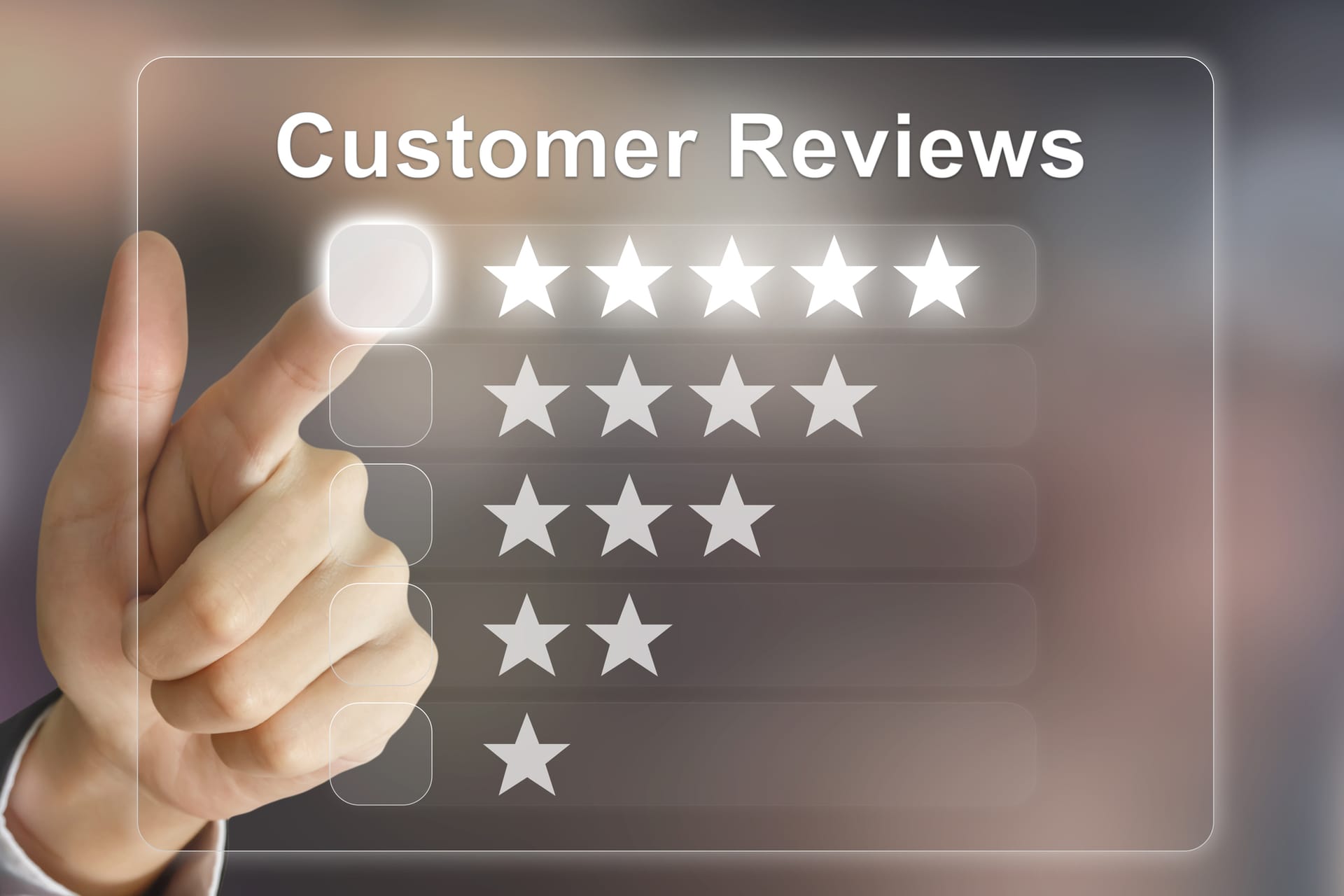You've seen these product reviews…
The product reviews are right! This thing is excellent!
Reliable seller!
Would buy again!
5-stars!
As an entrepreneur, those words are music to your ears. There's no better feeling than receiving a rave review, and it feels even better when customers leave you thousands of them.
Unfortunately, the allure of five-star reviews can also make sellers a bit greedy. There's a belief that you need more customer feedback than your competitors to succeed. Sure, there is some logic to that statement, but you shouldn't sell your soul to the devil to accomplish that.
How far would you go to get more positive product reviews?
There are many ways to increase your customer feedback, but you may stumble across some traps along the way. Remember, if it sounds too good to be true, it probably is. And getting reviews in a shady, inorganic manner will only bite you in the butt down the road.
For an excellent strategy that exudes nothing but integrity and excellent customer care, check out this conversation we had recently with Justin Ray and Gabe Klingman of Roam USA. As a gift to The One Percent community, these guys shared their system for getting 10,000 reviews on their products on Amazon. You can watch it right here:
What Is a Product Review?
In layman's terms, an online product review is a consumer's honest opinion about a specific product. Reviews can be positive, negative, or even neutral. Consumers may take about the service they experienced, criticize features, or make an overall assessment of their purchase. The most helpful ones always explain how the item did or did not meet the buyer's expectations.
Many online sites use a star rating system. The more stars a reviewer leaves (usually up to five), the better the product suited them. And if a consumer gives a product a low, one-star rating, the item obviously falls short.
People do read reviews—the good, the bad, and the ugly. According to BrightLocal, over 82% of consumers check out online reviews. Many of them trust reviews as much as they trust their friends.
Product reviews are so crucial to e-commerce that sellers will do almost anything to get them. Amazon ranks products based on their star ratings. There are even Shopify product reviews customization settings available to help brands showcase their ratings.
However, it's not always easy to get customers to leave five-star reviews. And you can't force something to say something positive about a product they don't like. So, instead, you may find yourself looking for other ways to boost your review score.
What Is the Wrong Way to Get Product Reviews?
The best reviews come from real customers who just want to share their experiences. There is no motive behind writing a review other than informing prospective buyers. If they like a product, they want to shout about it from the rooftops. However, if it left a bad taste in their mouth, they leave an ominous warning instead.
Seeking alternative ways to get more five-star reviews may seem promising, but you should avoid these five methods like the plague:

1. Paying someone to leave a positive review.
It may shock you to learn, but some companies exist solely to leave feedback for others. You pay a fee (usually top-dollar), and a mediocre writer pens a glowing review. What's the problem? It's illegal. The FTC forbids "using unfair or deceptive acts or practices in or affecting commerce." This rule covers any act deemed as false advertising, including paying for reviews.
2. Sending out free products in exchange for a review.
While it's not illegal to give free products or samples to customers or influencers, requiring them to provide a positive review is not good practice. You should leave it up to the individual if they want to review the product or not, and you should also allow criticism in their feedback.
3. Sweet-talking your friends and family to review your products.
Yes, your friends and family could be legitimate customers. But you should never rely on them to leave a five-star review. Doing so is a conflict of interest. And if your customers catch on, your business may develop a reputation for being untrustworthy.
4. Writing your own reviews.
It doesn't matter if you're are J.K. Rowling, Stephen King, or have a Ph.D. in English Language and Literature, you should NEVER write your own reviews. Of course, you think the product is the best out there—it pays your bills! There's no way a business owner can write an unbiased review for themselves under any circumstances.
5. Begging your customers to write online reviews.
There's absolutely nothing wrong with asking your customers to leave a review. Many will happily oblige, especially if they like your product. But continually sending out review requests will start to grind their gears. You want to build lasting relationships with your audience, and you can't do that if you become a nagging beggar.
Organic reviews are the only trustworthy ones. Harvesting feedback using these deceitful methods is not only dishonest, but it may be illegal or against a website's terms of service.

How Many Reviews Do You Need?
Remember, every business once started with zero reviews. Even those with thousands of five-star comments had to begin at the bottom of the barrel. Sure, getting as many positive testimonials is helpful, but it could take months or years to obtain meaningful reviews. But you can still be successful in the meantime. But don't let a lack of reviews keep you from growing a million-dollar brand.
Is there a magic number you should strive for? Yes and no.
When you first start out, you should work on getting sales by optimizing your products and growing an audience. Only after your first launch should you let product reviews even cross your mind. The CEO of PowerReviews, Matt Moog, shared his thoughts on product reviews with MarketWatch:
“Around 20 [and running up to 50] is the optimal number of reviews for a product to have to give consumers the confidence that this product has been tried enough by enough people.”
Twenty. That's it. If only 10 percent of your buyers left reviews, it would take around 200 sales to reach that number. Of course, you wouldn't want to stop there.
What Is the Best Product Review Site?
There are many product reviews sites out there, and depending on your industry and niche, you may want to get testimonials in one or more of them. Here are some to keep on your radar:
• Google My Business
• Amazon
• Yelp
• Better Business Bureau (BBB)
• CNET reviews
• Shopify
• Trip Advisor
• Yellowpages
• Manta
• Angie's List
• Foursquare

Which one is the best? Those with local businesses may argue Google My Business is the most relevant site. Of course, if you sell physical products on Amazon, getting reviews on that platform should remain your top priority. You'll want to collect reviews on Shopify if your company uses the platform. But collecting testimonials about your brand on other sites can also help deliver more traffic.
Are Product Reviews Reliable?
In a perfect world, all online reviews would provide an honest glimpse into the average consumer's personal experience. They would be informative and helpful. Business owners would be able to improve upon any criticism to make their produce or service even better. But that's not always the case.
According to The New York Times, "online reviews are less trustworthy than we think." Product reviews are subjective, and in many instances, emotions get in the way of providing an honest assessment. Plus, user error or problems outside the seller's reach may also play a role.
But some experts agree that negative reviews are necessary. Here's what Neil Patel says about negative product reviews:
“Bad reviews give customers a sense of the worst-case scenario. They want to know what can go wrong to understand just how much it will matter to them.”
The more organic reviews your product receives, the better. And yes, that includes even the bad ones, or in some cases, the brilliantly worded ones. Here's a sample of what happens when "15 People Share Their Brutally Honest Amazon Product Reviews", according to Did You Know (and yes, they are REAL reviews):
• Scissors review (5-stars)
What can you say about scissors? They're scissors. You put one blade on either side of something you wish to cut, squeeze the handles together, and it cuts. Super sharp, too. They cut almost as precisely as my father's comments about my career path.
• Lubricant review (5-stars)
Good lube. It's lube, not much more to say…Sometimes I like covering my body in it and pretend to be a slug while sliding around in my bathroom.
• Clock review (1-star)
Crazy clock. This clock is terrible. I have never seen a clock that goes to 15 o'clock. (Um, hello to the rest of the world and the military?)

Can I Trust Amazon for Reviews?
Amazon exists to make money. And without third-party sellers, such as yourself, its business model would cease to exist. The site goes above and beyond to make sure the products it sells are authentic, and because of this, it always puts the customer first.
Even though customers are the company's primary focus, there's no reason for sellers not to trust Amazon. As long as you follow the rules, sell with integrity, communicate promptly, and don't post fake reviews, your selling platform should do well.
Can You Trust Amazon's Choice?
Amazon rolled out its best-sellers label, coined Amazon's Choice, back in 2015. Initially, the company hoped it would encourage customers to purchase highly-rated products blindly from their Amazon Echo devices. However, as BuzzFeed points out, "It's a label automatically awarded to listings by an algorithm based on customer reviews, price, and whether it is in stock. And those choices Amazon's software makes aren't always reliable — in fact, sometimes they're Amazon-recommended crap."
Even though the goal of Amazon's Choice is to suggest the best products, the algorithms often fail. Consumers should still read reviews to develop their own opinions before making a purchase. And if you're a seller, you shouldn't lose any sleep over not getting this "coveted" title.
So, Should I Trust Amazon Reviews?
The majority of Amazon reviews come from actual customers. While you may stumble across a few questionable ones here and there, most are honest and truthful. The site puts a lot of safeguards in place to help maintain its reputation. Amazon doesn't allow certain types of reviews, including:
• Reviews by someone who has a financial interest in the product.
• Reviews by individuals who have a close personal relationship with the seller.
• Any review written by the manufacturer posing as a customer.
• Multiple negative reviews left by a single customer for the same product.
• Reviews written in exchange for money.
• A negative review from a seller on a competitor's product.
• Sellers who trade positive reviews with other sellers.

What Percent of Amazon Reviews Are Fake?
Even with so many rules and regulations, some fake reviews still end up on Amazon. It's not possible to find all of them. But according to Marketing Land, 61% of electronic reviews, 63% of beauty reviews, 59% of sneakers reviews, and 64% of supplements reviews are fake. What's even more interesting is that these are some of the top-selling categories in the marketplace.
But that doesn't mean every fake testimonial is inherently evil. Some will make you laugh until you cry. GreenLemon reported the "25 Times People Left Hilarious Product Reviews On Amazon." Here are the best funny product reviews examples:
• Knife (5-stars): This is one sharp knife. I have eight stitches in my left index finger to prove it.
• Inflatable mattress (1-star): I ordered this when I was drunk and thought it was a giant ice cream sandwich. It's not. It's a bed, not the $150 ice cream sandwich I wanted.
• Toilet bowl scrubber (2-stars): Causes too much pain and agony. Don't know why it's so popular nowadays. I'm just going to use toilet paper.
How Do I Know if an Amazon Review Is Legit?
There are millions of helpful and honest reviews on Amazon. Unfortunately, the average consumer may not be able to tell if a review is real or fake. In many instances, finding fraudulent reviews is much harder than searching for Waldo.
Wherever there are consumer reviews, there are fake testimonials. Amazon is not the only one to blame. Fake product reviews Shopify, Walmart, or CNET also exist. You may even run across a phony Consumer Reports review.
If the reviews are for your products and you didn't obtain them in questionable ways, they're probably authentic. But if you are the customer, you could read a fake one. Be on the lookout for reviews that seem like someone copied and pasted them. It a product only has five-star ratings, that's another red flag. Either the product really is that amazing, or the seller has someone working for them. When in doubt, run the listing through Fakespot for an in-depth analysis.

What Do You Say In a Product Review?
Now that you understand the importance of obtaining organic reviews for your brand, you may want to help other companies you support as well. The best product reviews should include both facts and opinions about the product. You want to make it as unbiased as possible, and you should try to keep emotions out of the mixture.
The next time you leave a testimonial, try to answer any questions you had before purchasing it. Did it meet your expectations? Is the quality acceptable for the price? Be sure to also touch on the communication you had with the seller. Did they ship in a reasonable time? What was the packaging like? And if you can add a photo or video to your review, even better.
If you still don't know what to say, read a few reviews left by others. You can even study free Consumer Reports to understand better what goes into an excellent product evaluation.
The Bottom Line
Reviews can make or break a business. Getting too many negative reviews without enough positive ones may deter potential customers. However, all testimonials need to come from real people who actually purchased the product. Trying to take a shortcut and obtaining reviews in unethical ways will not only land you in hot water, but it could put you out of business. Be an honest seller, and good results will follow.
The secret to success remains to grow an audience, provide meaningful products and put customer service at the forefront. Here’s a free video training series you should check out if you want to learn how.










